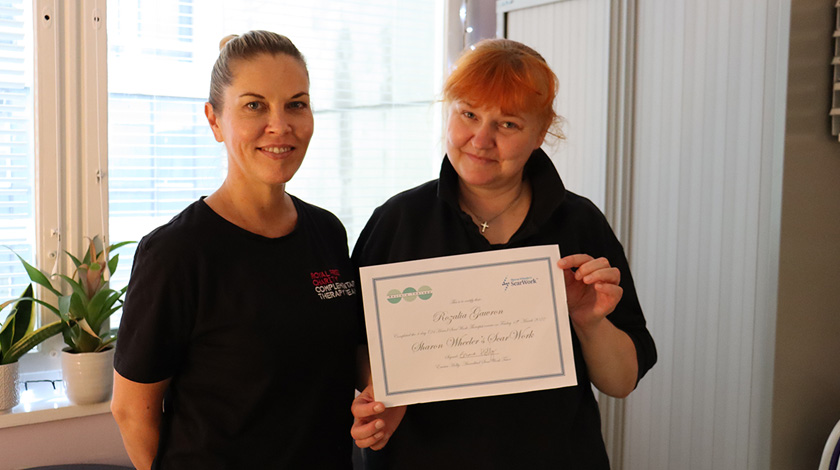
New service to aid patients’ scar tissue recovery
19 October 2022
Our complementary therapists have become the first charity-provided therapy team in the UK to offer scar tissue therapy to NHS outpatients.
Therapists Rozalia and Kris completed specialised training in scar tissue therapy during the summer. Now they’re working with the Royal Free Hospital’s oncology department to offer the treatment to patients who have recently had surgery as part of their cancer treatment.
Rozalia said: “Scar tissue therapy offers a new way for us to be holistic with our services. We often used to avoid these areas during a massage but now we have the professional level skills to help patients in a new way.”
Scars can be treated from four weeks after surgery. Although the service is primarily aimed at patients who have had a mastectomy, it can benefit patients undergoing a range of other surgical procedures from hand surgery, hip replacements, caesarean sections and many more.
Scar tissue massage therapy has several benefits including:
â—Ź increasing circulation in the affected area
â—Ź reducing itching, pain, and numbness
â—Ź softening the appearance of scars
â—Ź increasing the range of movement.
The therapy also has a positive effect on a patient’s mental health and recovery.
The first patients to benefit from the scar tissue therapy have noticed considerable improvements.
Patient A was referred to the team for treatment for a large scar in the palm of their hand which was affecting their manual dexterity. Before treatment they found it hard to open their hand fully and found simple things like holding a pen or opening a bottle difficult. After only four treatments, the patient has noticed a significant improvement: “My scar has softened and feels more hydrated. I can open my hand fully and have better grip and movement.”
The team received a referral for Patient B who had various scars on their right leg. Before treatment, the scars were tight and pulled on the ankle and knee area. The patient suffered with numbness. They found it particularly difficult to take part in activities with their young family, such as football, running and cycling. They also found it emotionally challenging coming to terms with their scars. They’ve had three treatments so far. After the first session, they said this was the first time since their accident that their leg felt normal. They now have sensation back in the leg. By the end of the third treatment, they have been able to take part in all their usual activities and feels much happier with their scar. “I don’t know what you did but this is incredible. Do you have magic in your fingers?”



